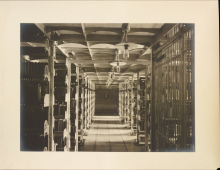You are here
Blair and Lee Family Papers
Related Topics
The collection consists of the personal papers of five members of the Blair and
Lee families of Maryland, Washington, D.C., and Virginia -- Francis Preston
Blair (1791-1876), his daughter, Elizabeth Blair Lee (1818-1906), her husband,
Samuel Phillips Lee (1812-1897), their son Blair Lee (1857-1944, Princeton Class
of 1880), and his cousin, Andrew Alexander Blair (1848-1932) -- reflecting their
various political, journalistic, naval, family, business, legal, and domestic
interests.The papers of Francis Preston Blair, journalist and politician, consist of
writings, correspondence, documents, Blair as a subject, printed matter, papers
of other persons, and additional papers. The writings include his speeches,
editorials, addresses, articles, essays, and general works dating from 1830 when
he was called to Washington, D.C., by President Andrew Jackson to edit the Globe, the official newspaper of the Democratic
administration. Although he never held an elective office, Blair was considered
a person of political importance and influence in the mid-19th century, and his
correspondence is indicative of this with letters by Jackson, Martin Van Buren
(1782-1862), and Andrew Johnson (1808-1875), as well as senators Lewis Cass
(1782-1866), John Charles Fremont (1813-1890), and John Jordan Crittenden
(1787-1863), and congressmen Schuyler Colfax (1823-1885), Edward Livingston
(1764-1836), and Thomas Patrick Moore (1797-1853).Also included is family correspondence, especially with his sons, Francis \Frank\
Preston Blair, Jr. (1821-1875, Princeton Class of 1841), lawyer, general, and
politician, and Montgomery Blair (1813-1883), lawyer, statesman, and postmaster
general in Lincoln's cabinet, and daughter, Elizabeth Blair Lee, wife of Admiral
Samuel Phillips Lee and mother of Blair Lee.In addition, there are documents including Blair's last will and testament,
financial papers such as receipts, checks, checkbooks, and account books. Among
papers of others persons, there is included the correspondence of Andrew
Jackson, manuscripts contributed to the Globe, and
old family papers, many of them relating to the family of Eliza Violet Gist,
Blair's wife.The papers of Samuel Phillips Lee, naval officer and farmer, consist of
miscellaneous writings and notes, diaries, memoranda books, and account books
(1858-1896), logs and journals (1847-1866), correspondence, documents, naval
records (1861-1872), maps, photographs, memorabilia, artifacts, miscellaneous
material, printed matter, and papers of others. Although a professional naval
officer (1825-1873), Lee spent his retirement years (1873-1897) at Silver Spring
farm, the management of which had been transferred to him by his father-in-law,
Francis Preston Blair. The collection reflects these dual careers as well as
Lee's business interests in real estate, especially holdings in St. Louis,
Missouri, Maryland, and Washington, D.C. An avid record keeper and commentator,
his logs, journals, notebooks, and correspondence contain memoranda of
explanation and insightful personal notations.Of special interest is the correspondence between Lee and his wife, Elizabeth
Blair Lee, during the long periods when he was at sea and she remained at home
in Washington, D.C., observing and reflecting on the political and social
scenes, especially during the Civil War years (1861-1864). The Civil War
correspondence of Elizabeth Blair Lee, dating from December 5, 1861 to March 4,
1865, has been published in Wartime Washington: The Civil War Letters of
Elizabeth Blair Lee, by Virginia Jeans Laas. The correspondence also contains
letters by family members such as his brother, John Fitzgerald Lee (1813-1884),
and sister, Frances A. Lee (1837-1889), as well as miscellaneous Blair and Lee
family members. Also included are naval personnel such as surgeon John Croxall
Palmer (1811-1883), scientist John Mercer Brooke (1826-1906), Gideon Welles
(1802-1878), secretary of the navy during the Civil War, and Alexander Dallas
Bache (1806-1867), superintendent of the Coast Survey. Many of the letters deal
with promotions, transfers, and requests for supplies.The documents contain both personal (naval appointments, powers of attorney,
wills, and financial papers) and real estate (tax receipts, deeds, leases,
insurance policies, and memoranda of agreement). About a quarter of Lee's papers
contain naval records, coal records, lists of officers, passengers, and seamen,
descriptions of ships, and prizes, to name but a few, for ships such as the
Brandywine, Young Rover, Vandalia, Newborn, Dolphin,
Severn, and Worcester. There are 101
maps in the collection pertaining to Lee's duty with the U.S. Coast Survey and
later during the Civil War as commander of the North Atlantic Blockading
Squadron and the Mississippi Squadron. The papers of others contain mainly
family correspondence.The papers of Elizabeth Blair Lee consist of correspondence, documents,
photographs, memorabilia, artifacts, miscellaneous material, and papers of
others. The correspondence contains letters by her husband, Samuel Phillips Lee,
and her father, Samuel Preston Blair, as well as other family members and
friends, including Rachel Jackson (1767-1828) and Jessie Benton Fremont
(1824-1902) whose photographs are also included in the collection. Locks of hair
belonging to Elizabeth Blair Lee can be found among her memorabilia, while the
artifacts contain bobbins, a necklace, a pair of satin slippers, and sewing
tapes. Other reminders of her domestic life such as cookbooks, notebooks,
recipes, prescriptions, and papers relating to the Washington City Orphan
Asylum, of which she was an active member, are included in the miscellaneous
material and printed matter.The papers of Andrew Alexander Blair, son of Francis Preston Blair, Jr., consist
of correspondence, miscellaneous material, and papers of others. The
correspondence contains primarily letters by family members, especially his
mother, Apolline Alexander Blair, written mainly when Blair was a midshipman at
the U.S. Naval Academy (1866). Among the papers of others, Samuel W. Very
(1846-1919), Blair's roommate at Annapolis, is represented by diaries
(1859-1860, 1863), notebooks, correspondence with family members and friends,
photographs, and memorabilia, including an autograph album.The papers of Blair Lee, lawyer and U.S. senator, consist of his writings,
correspondence, legal files, documents, financial material, miscellaneous
material, printed matter, and papers of others. The writings contain essays in
literature, philosophy, and politics, and course notebooks in languages,
science, the Bible, and other subjects while an undergraduate at Princeton
(1876-1880), as well as notes taken at Columbian Law School (1880-1883), and
manuscripts of political speeches.The correspondence is indicative of the close relationship between Lee and his
parents, Elizabeth Blair Lee and Samuel Phillips Lee, as well as the warm family
ties he enjoyed with the extended Blair and Lee families and later with the
Brooke family, the relatives of Anne Clymer Brooke Lee, whom he married in 1891.
Of special interest are the letters to Lee written from France by his sons who
served as officers in the U.S. army during World War I. The active political
role Lee enjoyed on a local, county, state, and national level, culminating in
his election to the U.S. senate in 1913 to fill the unexpired term of Isidor
Rayner (1850-1912), is reflected in the correspondence which includes letters by
William Jennings Bryan (1860-1825), congressman and unsuccessful candidate for
president in 1896, 1900, and 1908, President Woodrow Wilson (1856-1924), and
John Walter Smith (1845-1925), congressmen and senator from Maryland. The
correspondence also includes letters regarding Lee's ill-fated Maryland
gubernatorial race (1911) and the presidential election campaign of Wilson
(1912).In addition, there are letters pertaining to Lee's legal and business interests,
as well as general correspondence containing letters dealing with Grace
Episcopal Church in Silver Spring, recreational clubs such as the Takoma Park
Gun Club, Princeton and Ivy Club alumni activities, the administration of Silver
Spring farm, and friends dating back to Lee's youth and Princeton years. The
correspondence also contains letterbooks including copies of his letters to
family and friends, as well as political, legal, and business letters, and
invitations, calling cards, and address books. Among the legal files are papers
for cases handled by Lee, such as the Brown and Munsell gun case, the estates of
Senator James Beck (1822-1890), Morgan Lester, Francis W. Lusby, Allan McLane
(1823-1897), and Thomas W. Wise, as well as a challenge to the will of Judge
Joseph Holt (1807-1894), references to some French spoliation claims, and many
other miscellaneous cases. The documents and financial matters contain receipts,
checkbooks, ledgers, account books, canceled checks, and insurance policies for
Lee's farm, real estate holdings, and personal matters.His interests encompassed legal, philanthropic, fraternal, and political groups,
and the organizational files include correspondence, documents, and
miscellaneous material in varying degrees for the District of Columbia Bar
Association, the Metropolitan Club, the National Junior Republic, the Society of
the Cincinnati in the State of Virginia, the National Mary Washington
Association, the Washington City Orphan Asylum, and the Democratic National
Publishing Company, primarily for the Silver
Knight-Watchman.
The collection also includes family photographs, juvenilia, and memorabilia
relating to Lee's early academic and religious training as well as his years at
Princeton and Columbia Law School. There are political, legal, and business
papers contained in the miscellaneous material of the collection, as well as
blueprints, maps, and architectural renderings. Scrapbooks containing political
newspaper clippings and other printed matter concerning Lee's political, legal,
and business interests are included in the papers.The material in papers of others pertains mainly to Lee's family as represented
by his wife, parents, and sons, Edward Brooke Lee and Phillips Blair Lee as well
as miscellaneous family members. Also found are the legal papers and
correspondence of George H. Lamar (1865-1945) and William H. Lamar (1859-1928),
lawyers of Baltimore and Washington, D.C., and correspondence and printed matter
of Judge Joseph Holt.


